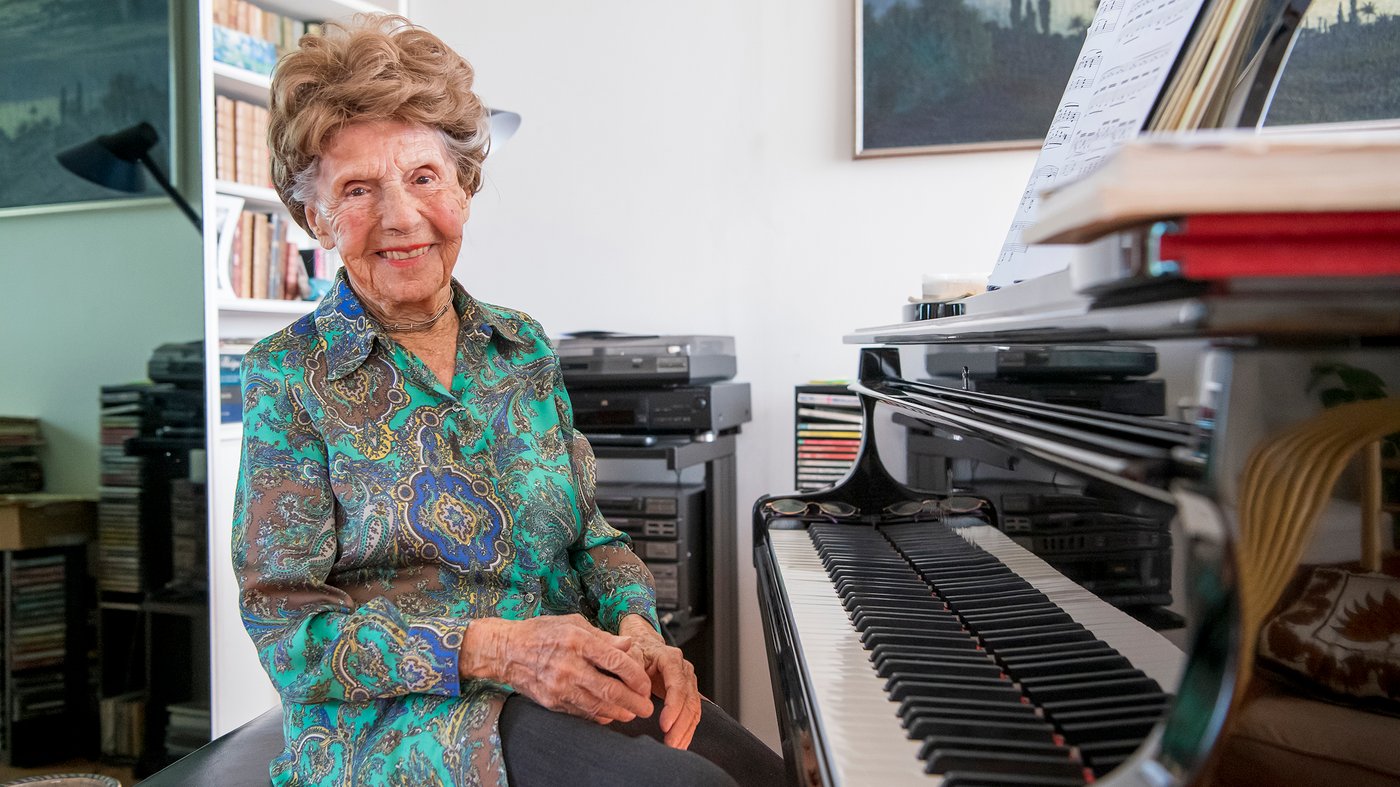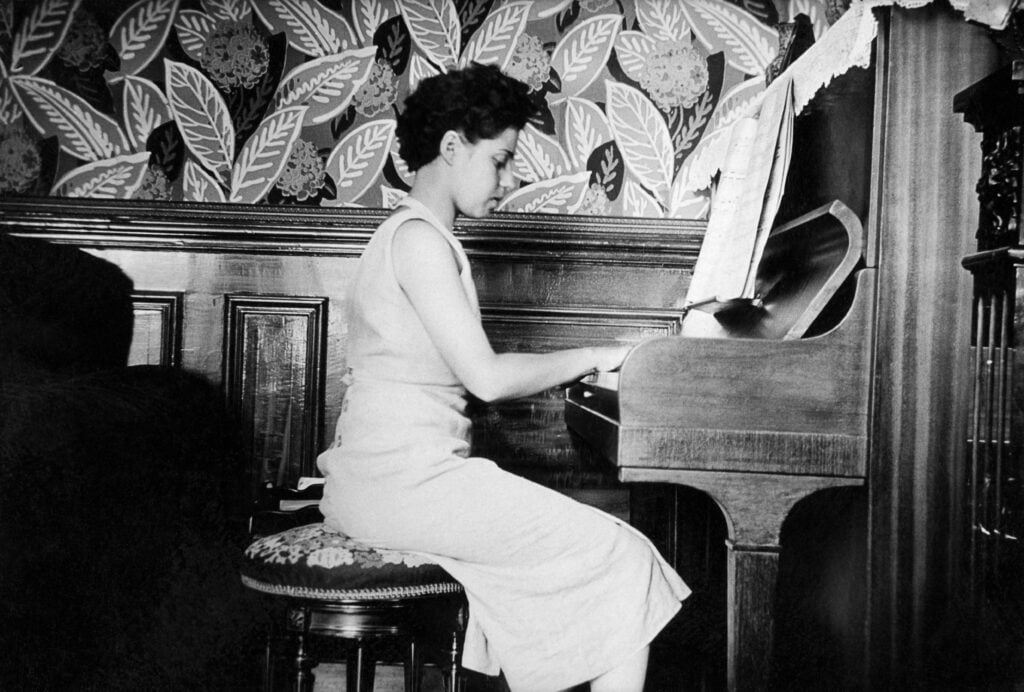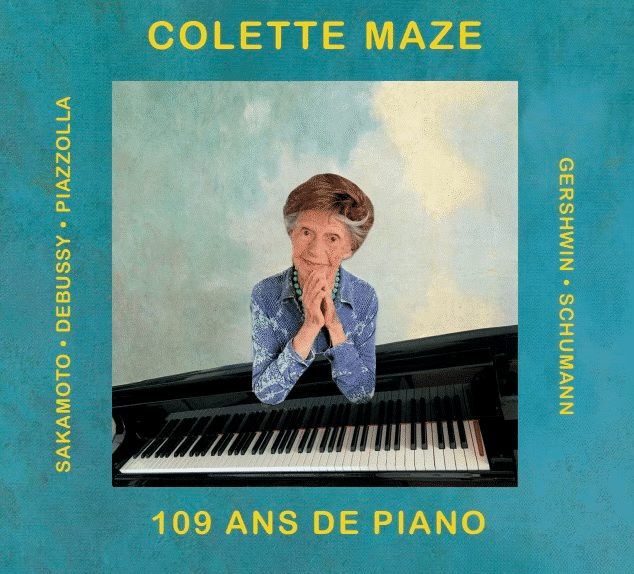
Colette Maze has been playing the piano for a very long time. More than a hundred years, in fact! She may be the oldest pianist in the world, if not the oldest recording musician alive. In fact, her seventh album—appropriately titled 109 Years of Piano—will be released June 23 and will contain works by Gershwin, Piazolla, Debussy, and Schumann.
Here is a brief biography of the remarkable Colette Maze, followed by advice she personally shared with us about learning, practicing, and appreciating music.
> 109 Years of Piano can be purchased here
Table of Contents:
Subscribe to The Note for exclusive interviews, fascinating articles, and inspiring lessons delivered straight to your inbox. Unsubscribe at any time.
UPDATE – November 22, 2023: Today we got the news that Colette has passed away. We are so honored and grateful to have collaborated with her while she was with us, and we wish her family warmth and healing at this time.
Born just a year before the start of World War I, Colette Maze began playing piano at age five. She was also an avid dancer and used her pocket money for dance classes.
In her interviews, Colette regards music as a sort of sanctuary. She frequently mentions very strict parents: her father took care of a factory and her mother was cold, sometimes abusive. “So, to fill my need for tenderness, it was music,” she says in an interview with Thomann Music.

But her mother was a violinist and her grandmother was also a musician, so Colette grew up in a musical environment and considers musicality a “gift” that was passed down. As a young child, Colette would listen to the children upstairs playing piano, then copy what they played by ear.
Colette’s family recognized her talent and moved close to the École Normale de Musique. Here, she studied under some of the most influential music teachers, including Alfred Cortot, Jeanne Blancard, Georges Dandelot, and Nadia Boulanger.
I don’t count the years. I’m no good at maths, so what’s the point? I was old at 15. I am much younger now.
Colette Maze, Interview with BBC

Colette Maze’s album 109 ans de piano (“109 Years of Piano”) can be purchased at uvmdistribution.com.
Despite studying with the best music teachers, Colette’s parents didn’t intend for her to pursue music as a career. At the time, music was considered a past-time for women, not a respectable profession.
Colette was able to attain the second-highest exam level in piano. But because her parents didn’t let her be home alone while they were away, she missed the practice time required to achieve the highest level—the performance level. But her qualifications did allow her to teach piano for many years.
Being a career musician was not easy when Colette Maze was a young woman. Her bourgeois parents wanted to marry her off to a wealthy young man, but she refused, disliking his style and love of hunting. After World War 2, Colette gave birth to a son. The father left and Colette’s parents refused to support her, so she struggled for a while as a single mother.
But it was Colette’s son, Fabrice Maze, who pushed her to record her music. Colette herself never had the desire to become famous, but Fabrice wanted to preserve her legacy. She is likely the only person alive who learned Alfred Cortot’s influential piano method from Cortot himself.
So, at the age of 87, Colette recorded her first album. She has since recorded several more, with the latest, 109 Years of Piano releasing summer of 2023. Likely the oldest pianist in the world, Colette has enjoyed viral success in recent years thanks to her steady stream of album releases.
Youth is inside us. If you appreciate what’s beautiful around you, you will find a sense of wonder in it.
Colette Maze (NPR)
Today, Colette Maze still plays piano every day. Four to five hours a day, in fact. She has lived in the same place since she was 18 and owns two pianos: a Steinway baby grand and a Pleyel she received on her 18th birthday. (Pleyel et Cie. is a French piano manufacturer and the preferred brand of Frédèric Chopin.)
Colette’s favorite composer is Claude Debussy. He died in 1918, when Colette was four years old, and the two of them actually lived near each other. Colette remarks that she may have even run into him at some point.
Other than some loss of sight and hearing, Colette is in good health and maintains the flexibility required to be acrobatic on the piano. Fabrice says there are three things Colette can’t live without: cheese, chocolate, and a good glass of wine.
I would say (my piano) is like a friend and I need to feel it, listen to it.
Colette Maze (Agence France-Presse)
We are privileged to have connected with Colette Maze herself and ask her questions about her relationship with music. Here are her answers in both the original French and translated into English.
J’ai rencontré Debussy durant mon enfance puisqu’il était d’usage de jouer les Children’s corner et j’aimais particulièrement Golliwogg’s Cakewalk, très rythmé et amusant. Debussy correspond à ma sensibilité car beaucoup de ses compositions étaient inspirées par le spectacle de la nature: Les vent dans la pluie, Des pas dans la neige, jardins sous la pluie, Clair de lune, Reflets dans l’eau, Brouillards, Bruyères, Feuilles mortes etc. C’est ce que l’on appelle de la musique « impressionniste » et j’aime ces climats où il faut créer une ambiance, un rêve éveillé. Je travaille toujours à partir d’une image qui m’inspire. D’ailleurs je pose souvent près de la partition une production de tableau de Monet ou une photo de paysage. Je suis en connection avec Debussy car il correspond à ma sensibilité profonde.
I first encountered Debussy as a child, as it was customary to play Children’s Corner, and I particularly liked “Golliwogg’s Cakewalk”—very rhythmic and fun. Debussy’s compositions were inspired by the spectacle of nature: “Les vent dans la pluie”, “Des pas dans la neige”, “Jardins sous la pluie”, “Clair de lune”, “Reflets dans l’eau”, “Brouillards”, “Bruyères”, “Feuilles mortes” and so on. It’s what’s known as “impressionist” music, and I love these climates where you have to create an atmosphere, a daydream. I always work from an image that inspires me. In fact, I often place a production of a Monet painting or a photo of a landscape next to the score. I’m connected with Debussy because he corresponds to my deepest sensibility.
Effectivement, ma vie n’a pas été un long fleuve tranquille, d’une part parce que le choix de la carrière de pianiste ne plaisait pas à mes parents, ni à mon milieu social, d’autre part, mon statut de « fille-mère » dans les années 50 était difficile à vivre socialement. Donc, j’ai dû travailler pour assurer financièrement ma vie et celle de mon fils. Le père de mon fils m’a vite quitté et la vie d’une femme seule n’est pas gai. Donc, le piano est devenu mon refuge, ma bulle, ma respiration. C’est dans la musique que je trouvais la chaleur et l’affection qui me manquaient. Le piano était mon ami, mon confident.
It’s true that my life wasn’t a smooth ride, partly because my parents didn’t like the choice of a career as a pianist, and partly because my status as a “daughter-mother” in the ’50s was difficult to live with socially. So I had to work in order to financially secure my life and that of my son. My son’s father soon left me, and the life of a single woman is not a happy one. So the piano became my refuge, my bubble, my breath. It was in music that I found the warmth and affection I was missing. The piano was my friend, my confidante.
La musique est ma nourriture, ma respiration, ma raison d’être. Dès que je me lève, je me mets au piano pour me connecter avec les forces de vie. C’est une habitude. Il en a toujours été ainsi. Je n’ai pas besoin de me motiver, c’est naturel. C’est comme une fonction automatique… Le sang circule dans notre corps et la musique circule dans mon être. C’est comme une nourriture essentielle.
Music is my food, my breath, my reason for being. As soon as I get up, I start playing the piano to connect with the forces of life. It’s a habit. It’s always been that way. I don’t need to motivate myself, it’s natural. It’s like an automatic function… The blood circulates in our body and music circulates in my being. It’s like essential nourishment.
J’ai été enseignée à l’École normale de musique de Paris et façonnée par la méthode Cortot qui repose sur le yoga et la souplesse. Donc, mes exercices reposent essentiellement sur la souplesse. Les pianistes actuels qui sont de brillants techniciens sont tendus et crispés. Les épaules, les coudes et les poignets doivent être souples. Par ailleurs, il faut travailler le toucher des doigts, la force dans un gant de velours. On m’avait appris le toucher du clavier en fonction du compositeur: plus raide avec Bach, plus contrasté avec les romantiques, tout en caresses avec Debussy.
I was taught at the École Normale de Musique de Paris and shaped by the Cortot method, which is based on yoga and flexibility. So my exercises are essentially based on flexibility. Today’s brilliant pianists are tense and tight. Shoulders, elbows and wrists need to be supple. You also need to work on the feel of the fingers, the strength in a velvet glove. I was taught that keyboard touch depends on the composer: stiffer with Bach, more contrasting with the Romantics, more caressing with Debussy.
J’ai toujours enseigné, aussi bien à l’École Normale avant 1940 et à partir de 1948. J’ai également enseigné dans un Conservatoire. Le but est de développer une sensibilité et une compréhension globale du morceau et du compositeur. Qui était Debussy, quels étaient les arts, peinture, sculpture, théâtre de cette époque et à quel moment de la carrière du compositeur le morceau avait été composé ? C’est une compréhension globale qui permet de jouer en toute lucidité et intelligence. Pour les petites classes, j’inventais des jeux, des images pour que l’enseignement soit ludique. Jouer, c’est la joie, la gaîté et non une corvée !
I’ve always taught, both at the École Normale before 1940 and from 1948 onwards. I’ve also taught at a Conservatory. The aim is to develop a sensitivity and a global understanding of the piece and the composer. Who was Debussy, what were the arts — painting, sculpture, theater — of the time, and at what point in the composer’s career was the piece composed? It’s an all-encompassing understanding that makes it possible to play with lucidity and intelligence. For small classes, I invented games and images to make teaching fun. Playing is a joy and a pleasure, not a chore!
Il n’y a pas d’âge pour jouer au piano. J’ai continué à progresser à partir de 87 ans quand j’ai enregistré mon premier album ! Bien évidemment, tout dépend de l’enseignement et du professeur. Il faut écouter les grands pianistes… L’essentiel est de prendre du plaisir à jouer pour soi. Peu importe le niveau technique. On ne demande à aucun pianiste de devenir concertiste. Chacun son niveau peut prendre du plaisir à jouer ses compositeurs favoris.
There’s no age limit to playing the piano. I continued to progress from the age of 87 when I recorded my first album! Of course, everything depends on the teaching and the teacher. You have to listen to the great pianists… The most important thing is to enjoy playing for yourself. It doesn’t matter what your technical level is. We’re not asking any pianist to become a concert pianist. Everyone at their own level can enjoy playing their favorite composers.
One of the most common questions we get as a piano teaching platform is: “Am I too old to learn how to play piano?”
You are not! In fact, we believe age can be an advantage.
As an adult, you’ve been exposed to music all your life. You can likely tap out a rhythm or hum a song with no problem. In other words: you have an existing musical background.
Adults also understand the value of practice. You’ve likely studied, worked, and been responsible for others. You know that results take effort.
We can’t promise you viral success like Colette Maze (who, to be fair, first learned piano as a child), but it is absolutely possible for adults to play at an intermediate level, have fun, and show off a little.
So go out there and play 🙂
> Learning Piano As an Adult: Tips & Exercises
The best way to learn piano is with real teachers, but not everyone has the time and money for a private instructor. At Pianote, you can get real feedback from real experts…all from the comfort of your own home. Explore our Method and community with a free 7-day trial.
TRY PIANOTE FOR 7 DAYSReferences and more info:
Correction: A previous version of this article mistakenly stated that Colette Maze worked on her first album at age 84, when the correct age should be 87.
Charmaine Li is a Vancouver writer who has played piano for over 20 years. She holds an Associate diploma (ARCT) from the Royal Conservatory of Music and loves writing about the ways in which music—and music learning—affects the human experience. Charmaine manages The Note. Learn more about Charmaine here.


By signing up you’ll also receive our ongoing free lessons and special offers. Don’t worry, we value your privacy and you can unsubscribe at any time.
We use cookies for traffic data and advertising. Cookie Policy »